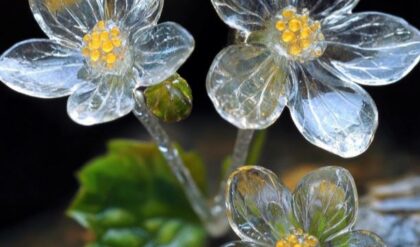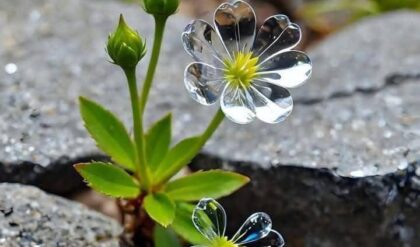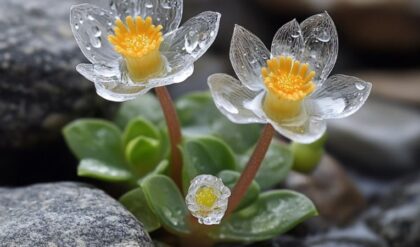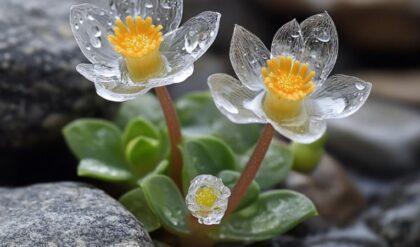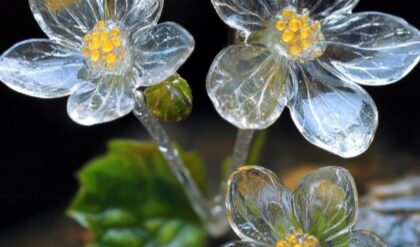There’s a certain calmness that comes from tending a garden—a sense of control and predictability. But what happens when nature defies those boundaries? When something so extraordinary, so unsettling, takes root in your backyard? That was precisely the dilemma faced by Jenna Owens, an avid gardener and a well-respected plant enthusiast in her quiet neighborhood of Maplewood.
Jenna was known for her gardening prowess. She cultivated everything from the rarest orchids to exotic ferns. But her greatest pride was her collection of hostas. She loved these shade-loving perennials for their lush foliage and unique variegation. Her backyard was a tapestry of greens and whites, a living canvas of leaf shapes and textures that could rival any botanical garden.

One day, while attending a local gardening expo, Jenna came across an unusual vendor. His stall was tucked away in the corner, overshadowed by more popular exhibitors. Unlike the others, his booth wasn’t adorned with vibrant flowers or exotic trees. Instead, it was sparse, almost forgotten, save for a few pots containing unremarkable hostas. At first glance, they seemed like the common varieties Jenna already owned. But as she prepared to walk away, a strange pot caught her eye. The label read: “Hosta Montrosia Giganteus – Rare Mutant Variety.”
Intrigued by the name, Jenna inquired. The vendor, an older man with deep-set eyes, leaned in close. “This isn’t just any hosta,” he whispered. “It’s a mutant. A genetic anomaly. It can grow to unimaginable sizes if you know how to care for it properly.”
Jenna was hooked. She had never heard of this variety before, and the mystery surrounding it piqued her curiosity. She purchased the pot for a surprisingly modest price, unaware that this decision would soon alter the course of her gardening journey—and her life.
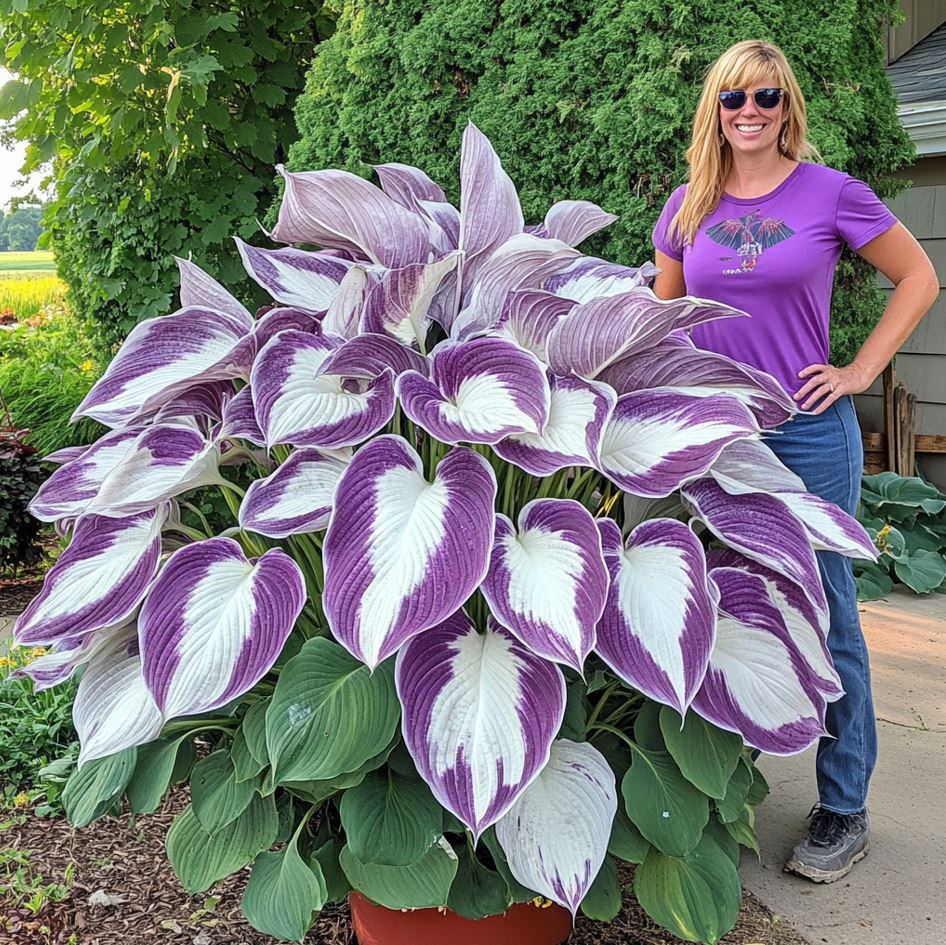
The Growth Surge
Back at home, Jenna planted the hosta in a secluded corner of her garden, where it would have the perfect balance of shade and dappled sunlight. She treated it with organic fertilizer and followed all the advanced gardening tips she had learned over the years. Days turned into weeks, and the plant began to grow. But it wasn’t until the third week that she noticed something extraordinary.
The hosta, initially small and unassuming, began expanding at an alarming rate. Its leaves unfurled wider and thicker, each one reaching nearly three feet in diameter. The deep green hue was marked by intense white variegation that seemed to glow under the moonlight. And it didn’t stop growing. By the end of the month, it was over six feet tall, with a spread that dominated her backyard. Neighbors started to notice. They’d slow down as they passed her house, peering over fences, some even stopping to ask what kind of plant it was.
“I’ve never seen anything like it!” exclaimed Mr. Thompson, a retired botanist who lived two houses down. “You might have discovered a new species!”
With the increasing curiosity, Jenna began documenting the plant’s growth online. She posted on forums, shared pictures on social media, and even started a YouTube channel. The buzz around the “Giant Mutant Hosta” grew, bringing gardening enthusiasts, botanists, and even geneticists into heated debates about the plant’s origins and growth potential.
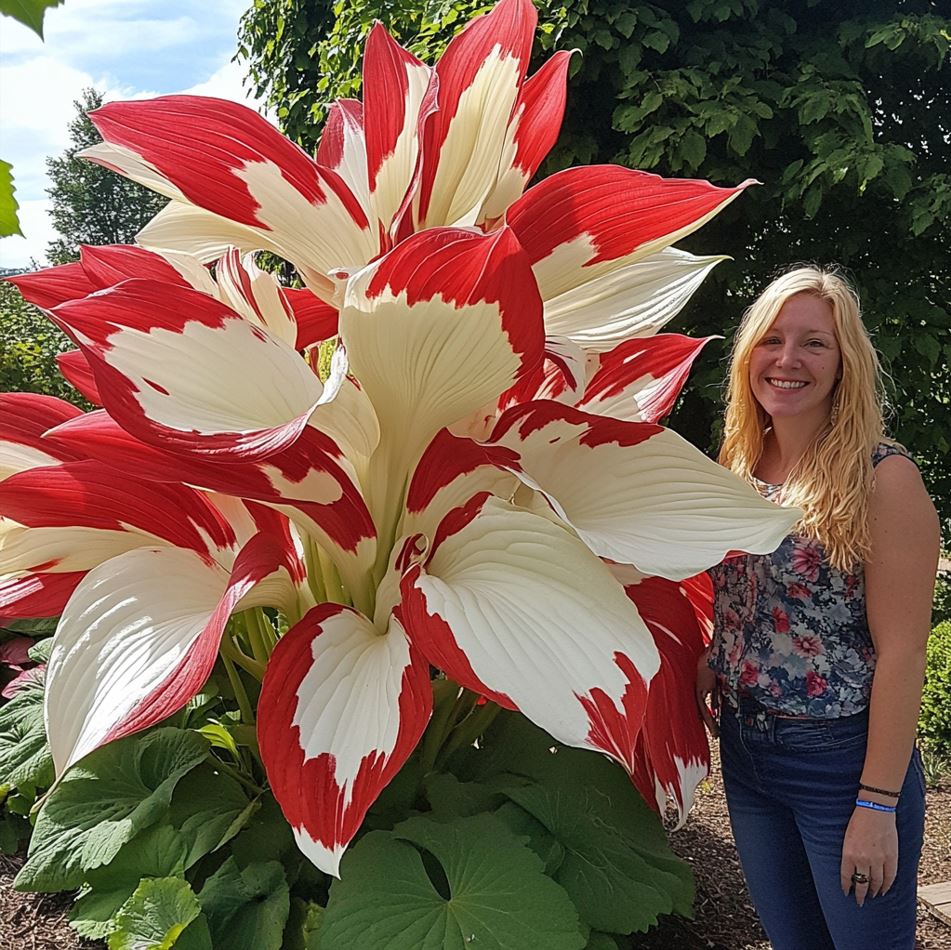
A Frightening Discovery
As the weeks passed, Jenna noticed something peculiar—none of the other plants around the hosta were thriving. The once vibrant ferns were wilting, and the soil seemed drier, almost devoid of nutrients. She tested the soil quality and found it strangely acidic. It was as if the hosta was leeching all the nutrients from the ground, starving the surrounding plants.
Concerned, Jenna decided to dig deeper. She reached out to Dr. Albert Weissman, a renowned botanist and plant geneticist from the state university. After examining the plant, Dr. Weissman appeared both fascinated and alarmed.
“This isn’t just a hosta,” he said, his face a mixture of excitement and concern. “It’s something else entirely. The mutation seems to have altered its root structure, making it highly aggressive. It’s possible that it’s feeding on more than just nutrients—perhaps even microbial life forms in the soil.”
Jenna’s excitement quickly turned to dread. She had read stories about invasive species taking over ecosystems, but this was her garden, her sanctuary. She decided to do some research on home gardening insurance and looked up ways to protect her property, just in case this hosta turned out to be more than she bargained for.
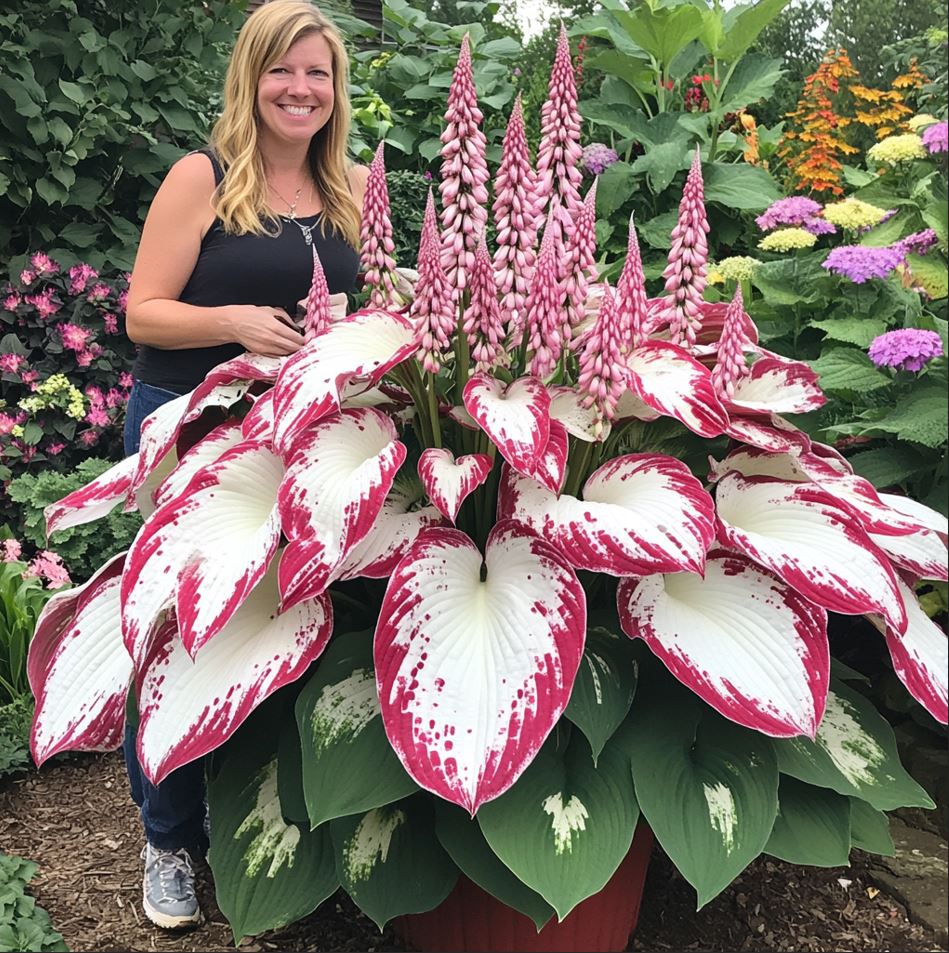
The Invasion Begins
Within two months, the hosta had grown to over ten feet tall, and its leaves had taken on an almost prehistoric look—thick, leathery, and spiked at the edges. Its roots were spreading, pushing up bricks from her garden path and overtaking nearby flower beds. The once-beautiful backyard was now a battleground.
Jenna tried everything—trimming the leaves, cutting back the roots, even applying chemical barriers to contain its growth. But the more she cut, the faster it grew. She decided to dig it up and remove it entirely, but when she tried, the roots seemed to have burrowed deep into the ground, far deeper than any normal hosta could.
In desperation, Jenna turned to her online followers for help. Her YouTube channel, now aptly named “The Hostage of the Hosta,” went viral as she chronicled her battle with the monstrous plant. Her RPM and CPC skyrocketed with each new video as viewers tuned in for the next chapter of her saga.
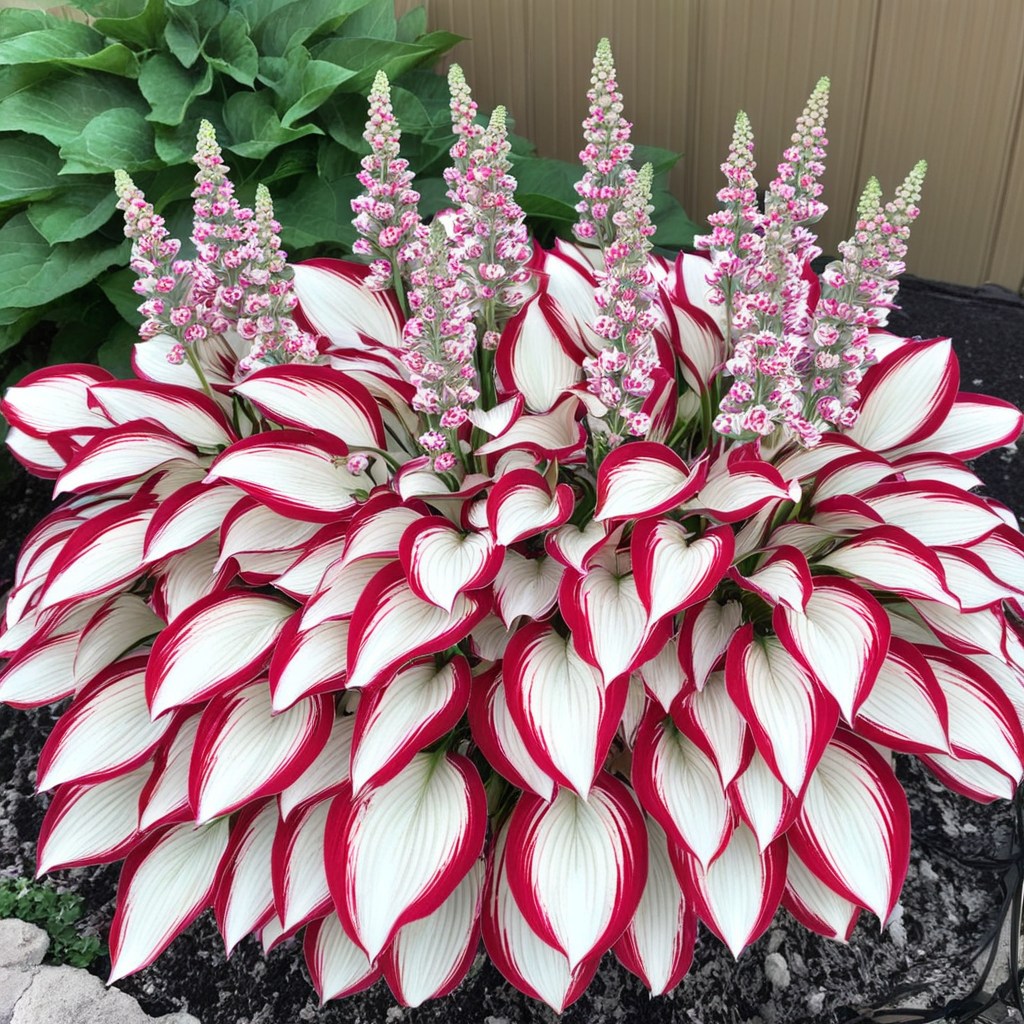
A Last-Ditch Effort
With the hosta now taking over half of her backyard and threatening the foundation of her house, Jenna knew she needed drastic measures. Dr. Weissman suggested a radical idea—injecting the hosta with a specially formulated herbicide that could potentially neutralize its aggressive growth without harming the rest of the garden. But there was a risk: the hosta could react unpredictably, perhaps even more violently.
Determined to regain control of her garden, Jenna agreed. She documented the entire process, from the preparation of the herbicide to the tense moment of injection. As the needle pierced the thick stem of the hosta, a strange hissing sound emanated from the plant, followed by a foul smell. Jenna stepped back, her heart pounding in her chest.
For a few minutes, nothing happened. Then, slowly, the hosta began to tremble. Its leaves, once stiff and towering, started to curl and shrivel. It was working! But just as relief washed over her, the ground beneath her feet began to shake. The hosta’s roots, now exposed, twisted and writhed like serpents, breaking through the soil in a frenzy.
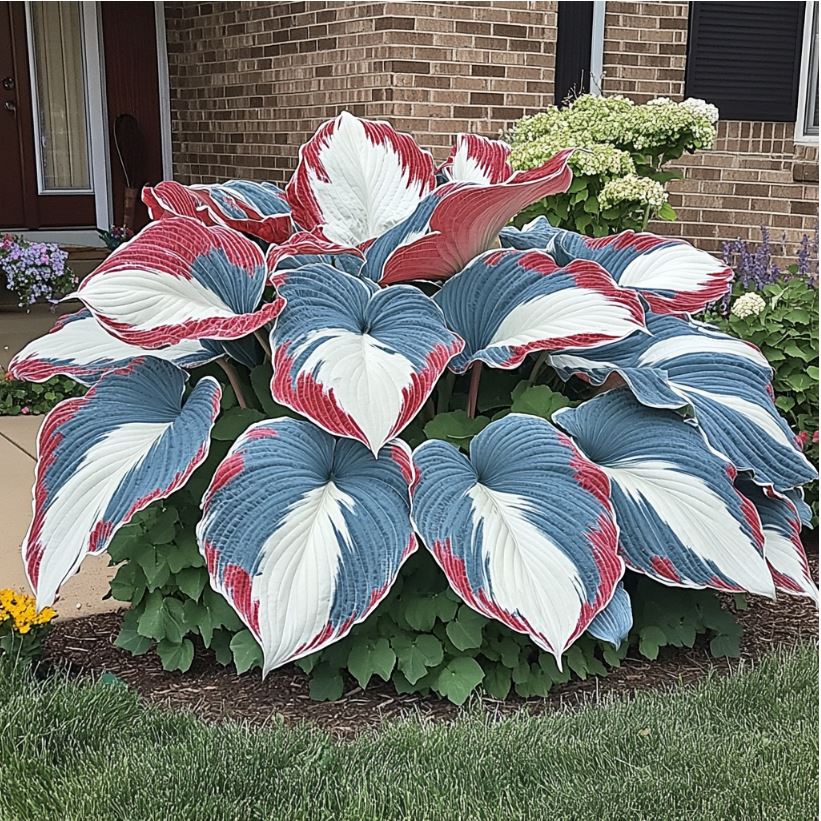
The Aftermath
The battle lasted only minutes but felt like hours. When it was over, the hosta lay lifeless, its once-mighty leaves reduced to a soggy heap. Jenna’s garden, however, was in ruins. The soil was overturned, paths destroyed, and plants uprooted. It was a small price to pay, she thought, for ridding herself of the invasive menace.
In the days that followed, Jenna’s story became a sensation. She was interviewed by gardening magazines, featured on news channels, and invited to speak at horticultural conferences. Her YouTube channel continued to grow, now focused on exotic plant care, rare plant discoveries, and tips on protecting your garden from unknown threats.
Jenna’s garden eventually recovered, thanks to a lot of hard work and some home gardening insurance she wisely invested in after the ordeal. But she kept a small corner of the yard untouched—a reminder of the giant mutated hosta that once took over her life.
And sometimes, when the wind blew just right, she could still smell that strange, pungent odor—the scent of a garden’s darkest secret.

Epilogue: A New Seedling?
Months later, as Jenna was tending to her newly restored garden, she noticed something peculiar. Hidden in a corner, amidst the fresh mulch and new plantings, was a small green shoot. It looked oddly familiar. She bent down to examine it, her heart pounding with a mix of fear and excitement. Could it be? Another hosta?
Or perhaps… a new mutation?
Jenna’s hands trembled as she reached for her gardening gloves. She had a decision to make. Dig it up now, or see where this new adventure might lead?
One thing was certain—her garden would never be the same again.
